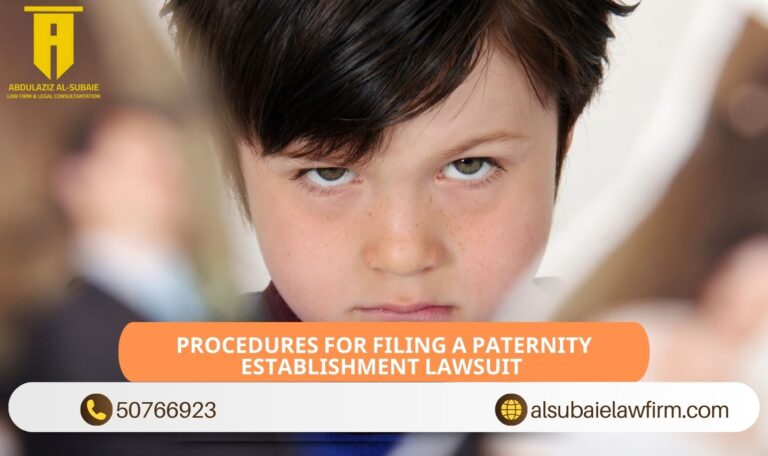Conditions for Acceptance of a Paternity Establishment Lawsuit in Kuwait
By consulting with a team of personal status specialists at 50766923, one may verify the following prerequisites for admitting a child’s paternity claim before the court:
- At least the minimum gestation period of six months must have elapsed since the date of marriage.
- No substantial impediments must have prevented marital relations until the child’s birth.
- No marital intercourse must have occurred after marriage if it was followed by a separation lasting one year.
- The court will accept a father’s written acknowledgment to establish paternity for a child of unknown parentage.
- The court will also give effect to a mother’s acknowledgment of paternity for a child born out of wedlock, provided the father has likewise acknowledged.
Required Documents for Establishing Paternity

The documentation required varies according to the claimant’s status as a Kuwaiti national or an expatriate.
For Kuwaiti Nationals
- Copy of civil identification card.
- Official birth notification.
- Certified copy of the birth certificate.
- Marriage contract.
- Copy of nationality certificate.
For Expatriates
- Copy of civil identification card.
- Official birth notification.
- Certificate issued by the claimant’s embassy, duly translated and attested.
- Marriage contract.
- Copy of passport, with an official Arabic translation.

Procedures for Filing a Paternity Establishment Lawsuit from a Valid Marriage
Whether initiated by the claimant or handled through Al-Subaie Law Firm at 50766923, the following steps apply:
- Submit the application and supporting documents to the Committee for the Establishment of Paternity.
- Alternatively, file the claim electronically via the “My Identity” app, following authentication and digital signing.
- The committee schedules a hearing date to consider the claim.
- The appointed attorney, under a formal power of attorney, appears at all sessions with evidence and witnesses.
- After the inquiry, the Committee for the Establishment of Paternity forwards its recommendation to the Claims Officers Department for further action.
- The attorney drafts and submits a formal statement of claim detailing the parties’ identities and the factual basis for paternity.
- All documentary evidence is lodged with the court’s registry.
- The court assigns a case number and schedules subsequent hearings.
- Court fees are paid to finalize the claim’s registration.
- Notification of hearing dates is effected on the opposing party through a process server.
- The judge reviews the filings and issues a ruling on paternity.
Paternity Establishment Lawsuit in Kuwait from an Illicit Relationship
The court admits a paternity claim arising from a non-marital relationship if the following conditions are met (consult Al-Subaie Law Firm at 50766923):
- A signed acknowledgment by the respondent must accompany the claim.
- The petition must state the factual grounds for asserting paternity.
- Only the person entitled to establish parentage—father, mother or child—may bring the claim.
- The court may overlook inconsistencies between a paternal claim and a filial claim in the same case.
Procedures for Filing from an Illicit Relationship
A petition initiated by the father, mother or child must include:
- Full identification details of both claimant and respondent, and of any legal representative.
- A clear statement that the object of the suit is to establish paternity.
- A narrative of the factual circumstances giving rise to the claim.
- All legal documents and corroborating evidence.
- A request for DNA testing may be included for both parties.
- The petition must bear the signature of the claimant or their authorized agent.
Use of Genetic Fingerprinting (DNA) to Establish Paternity
The court permits DNA testing in the following scenarios:
- Recovery of missing children after accidents, to verify identity and parentage.
- Cases involving unknown parentage where documentary proof is insufficient.
- Allegations of illicit sexual relations where parentage cannot be determined otherwise.
- Confusion among newborns in medical facilities, to ensure accurate registration.
- Disputes arising from assisted reproductive technologies, to confirm genetic links.
Right to Disavow Paternity
To file a disavowal of paternity claim following a valid marriage, the following legal conditions apply:
- The husband’s explicit or implicit non-recognition of the child as his own.
- The action must be brought within seven days of the child’s birth.
- A lai’an (“oath of denial”) must be filed by the husband within fifteen days of birth or from learning of the birth.
Services of Al-Subaie Law Firm
For assistance in paternity matters, Al-Subaie Law Firm offers:
- A comprehensive explanation of all available legal avenues for establishing paternity in clear, accessible language.
- Preparation and filing of a robust statement of claim on behalf of the client.
- Representation at all hearings, including the presentation of conclusive evidence.
- Assistance in obtaining court-ordered DNA testing to confirm biological relationships.
Contact: 50766923
Frequently Asked Questions
What are the procedures for establishing paternity in Kuwait? A qualified attorney may file a lawsuit with the Committee for the Establishment of Paternity or via the Ministry of Justice’s electronic service to set a hearing date and obtain a judicial ruling.
When does a paternity establishment suit lapse? The claim is dismissed if it is proven that the husband is infertile, if the husband is imprisoned for at least one year, or if less than six months have elapsed since the date of marriage.
What is the importance of establishing paternity? Establishing paternity imposes a legal duty of support on the father, secures the child’s inheritance rights, affirms maternal custody, grants Kuwaiti nationality, and confers a legal name and family lineage.
Is it permissible to establish paternity without marriage? Yes. A paternity suit may proceed in the absence of a formal or customary marriage contract by relying on genetic testing or credible witness testimony to prove the parent–child relationship.
What are the legal conditions for filing a paternity disavowal claim? A husband may seek to disavow paternity of a child born outside a completed marriage or after a prolonged period following divorce, subject to the statutory time limits.


